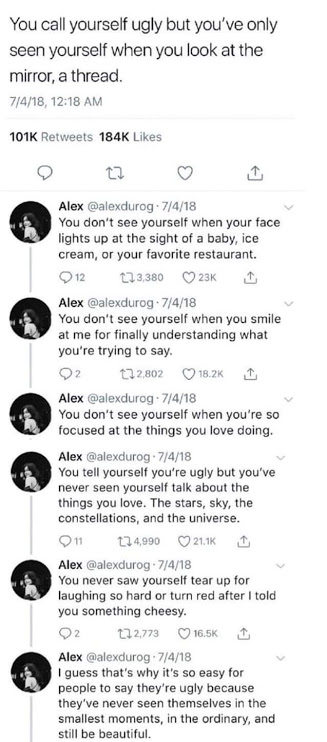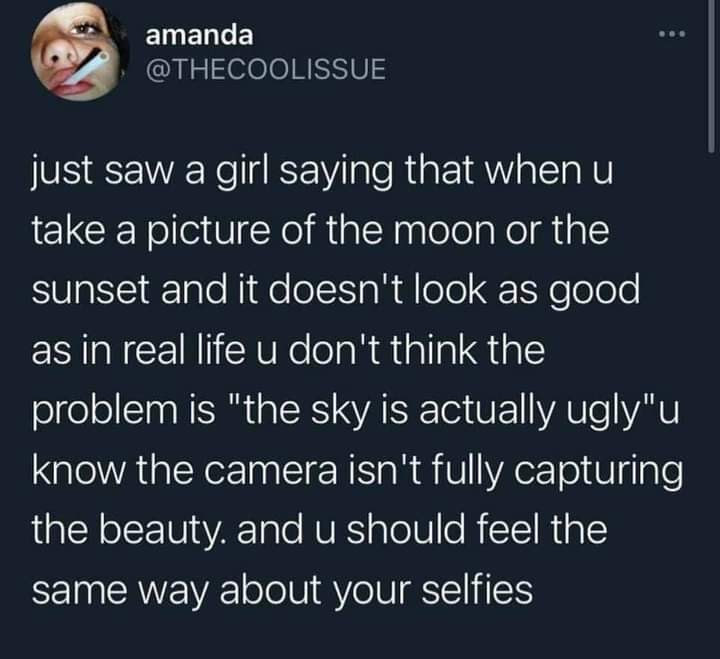I’m writing this article after spending a day on video calls, after almost a year of full-time work that consists of video call, after video call…after video call. Back to back.
This isn’t a rant about my job (good luck eking one of those out of me, I fucking love this gig) but rather, an observation I’ve come to meditate on after this last year: being on video calls all the damn time is affecting me. And it’s probably affecting you, too.
The recoding of home as a workspace, the crushing lack of social stimulus, the distant warmth of virtual interactions, the hassle of technological snafus: by now, we are accustomed to these woes. Something that society hasn’t quite acknowledged or dealt with in a real way are the impacts of the stressful-as-hell last year (pandemic, election, work from home, social isolation, financial woes, to name a few) on the way we are feeling about ourselves. More specifically, I want to examine the impacts of this last year on our mental health as it relates to body image.
Body image, a term you’ve heard of before, here refers to our internal perceptions around our own physical wrappers. How we feel about our body emotionally, how we perceive our body to be, our internal representation of our body, thoughts and beliefs we have about our body, actions we choose to take with our bodies in mind, reactions we have to our bodies, etc. Body image can align with real-life facts about our bodies (“I have brown hair”) and they also can not (“I look hideous today.”) So when we talk about body image, understand I am here referring to judgements, beliefs, feelings, and assessments you make about your body rather than a measurable, factual description or attribute of your body.
OK, back to the beginning. This essay was prompted by my realization that, “Shit, looking at my face on video calls all day seems to be wreaking some havoc on the way I think and feel about my body.”

And so it has.
I am no stranger to needing to moderate my body language as a part of my job; to convey interest, to show I am listening, to express empathy for other folks and their important stories. There are varying levels of consciousness that go into me moderating and managing my body’s presentation as a part of my regular life, both personally and professionally (those of you who have watched me eat a meal on camera may disagree). That said, the ever-present reminder of my body and facial posture is a novel stimulus, one that I have found pulls me out of the moment and is often accompanied by a set of checking mechanisms: Am I sitting up straight enough? Is my head posture ok? Should I be smiling like that? Look at that resting bitch face! Girl, pick up that chin!
Growing up, body image was something I struggled with. Most do. Being a growing kid and an awkward teenager was an awful time that I would not prefer to return to (even if I could time travel with the knowledge to invest in bitcoin, yes, even then).
Body image can be influenced and impacted by internal factors (emotions, thoughts, feelings, belief systems, ability level) and external factors (season, culture, fashion, environment, peers, family, beauty trends, social media, advertising). These can look like —
Here’s some tough and judgemental internal factors —
“I feel tired today,” “I wish I looked like her,” “I am worried about others’ judgements of me,” “I don’t like the way this looks,” “Curly hair is hard to get right,” “I feel like a blob,” “Nobody wants me,” “I’m never gonna get a partner if I look like this.”
Here’s some external factors that can contribute to poor body image —
Being bombarded with photoshopped and digitally altered bodies in the media, being subject to weight loss ads all over the place, seeing everyone’s fun vacation pics on social media, low-rise jeans making a comeback, a culture that places value on being attractive, a culture that equates attractiveness with thinness or the ability to gain weight or muscle only on certain parts of the body, it being “swimsuit season,” having been made fun of or teased, being put down by a partner or family member, being in proximity to someone else negatively judging themselves.
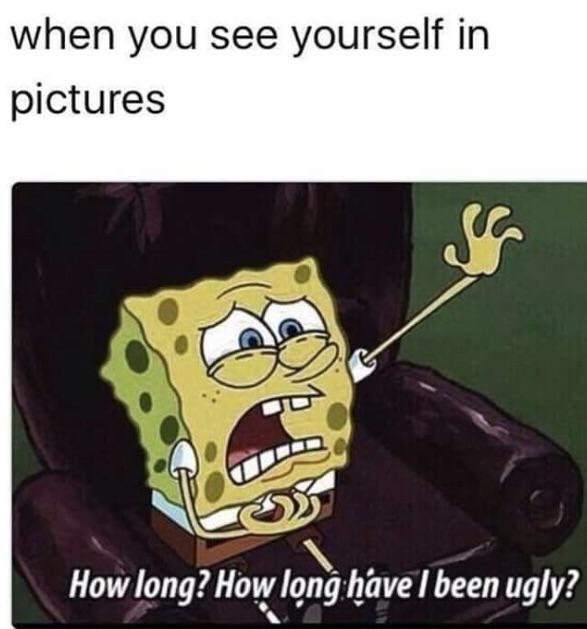
As a kid, I grew up when waif-thin bodies were all the rage and you couldn’t find a pair of jeans that went much higher than your buttcrack. I grew up in a household where my parents were constantly trying fad diets and yoyoing back and forth, where weigh-ins were, like, a thing you did, along with critically checking out all food labels and counting, counting, counting. I grew up learning that exercise was a punishment and that eating something tasty was “bad.” I grew up with a mother critical of her body and appearance and put herself down constantly. I grew up being teased for my looks, my clothes, and my body. To say the least: that was hard on me, and contributed to a deep self-loathing evidenced by almost constant criticism of myself and my body.
What do folks in this situation do? How can we improve body image?
Let’s boil it down — there’s two ways to deal with this. You can either change your appearance to be that which you believe it should be. OR, you can change the way you feel about your body.
It’s not just because I’m a therapist that I suggest option 2 to be more beneficial. Hear me out: sure, you can change your body to be a specific way and in doing so hopefully alleviate some of that stress in that specific condition, OR, you can alter your exposure to negative stimuli and adapt your personal internal beliefs and in doing so alleviate the stress around your body and appearance permanently, regardless. Option 2 seems more all-encompassing and frankly more likely to yield a longer-lasting positive result than option 1, which is dependent on your body, which is going to change over time.
Anyways. So what does this look like?
Focus on function over form
Our bodies exist to accomplish. Have you ever thought about that? How cool is that?? Our body works everyday to be alive. It does things for us. It might get us from A to B, it might think of a cool idea, it might give us a feeling of pleasure, it might create something neat (including but not limited to artwork and miniature humans), it might just open a jam jar (sadly, mine does not have this ability). One of the most healing experiences I have had with my body was taking a long, exploration-oriented road trip this last year. Allowing myself to exit the rat race for a bit and focus on seeing cool sights in nature was healing in that it allowed me to focus on and celebrate my body’s victories rather than fixate on my body’s perceived shortcomings in the appearance department. I was able to feel gratitude and recognize the privilege of being an able-bodied person, which allowed me to refocus my relationship with my body to be more action-oriented rather than appearance-focused.
Positive or neutral self talk
I get it, this one you’ve heard before. Look, I’m not expecting you to go from “My face is atrocious” to “Gosh, I am just dandy!” overnight. Let’s set a realistic goal.
First, take an assessment of how you talk with yourself about your body. What do you think? How do you say stuff to yourself? How is that feeling? Becoming conscious of something that may have been unconscious can be tricky and uncomfortable. It’s OK, allow yourself some time and space to be an observer to your thoughts.
If you do notice some of your self talk trending to the negative, a good starting point can be to counter those thoughts, or notice when you’re having them and stop. You can also work to replace those thoughts with others, beginning with a more neutral assessment. Rather than “My nose is ugly, look at that bump,” it can simply be “There’s a nose on my face.” I know this sounds silly, but bear with me: it takes work to separate out our assessments from our body from the reality of our body, and yes, they are two different things. The more distance we can create here, the better we become at zooming out and separating our body image from the objective reality of our body. With time, incorporating more neutral and positive self talk can help to balance the scale — “My nose is an important part of my face. It is a striking contributor to my features.”

Build your positive self-talk toolkit
So, this is similar to the above, with the caveat that we can create messages to remind ourselves of positive or neutral things of our body image or self-worth. Countering your negative self talk is huge, as well as proposing realistic and positive self talk. Like, “I find that person attractive, and they are not an instagram model, so I don’t need to hold myself to that standard,” “I am more than a collection of singular body parts, as a whole I like myself,” “Of course if I see my face from that angle it will look weird, but no one else ever sees that,” “I feel good about myself and who I am,” “My character matters to my attractiveness,” “Beauty is a state of mind; openness, confidence, humor, and kindness are beautiful attributes,” you get the gist.
I’m a huge fan of Aerie and their marketing around body inclusivity, but also around their presentation in their fitting rooms. If you haven’t been in there before, when you try on clothes in their store, you are greeted by a mirror littered with positive post-it notes, each with a lovely, body-positive message on it, written by both staff and consumers. This kind of reminder can serve you well at home or on-the-go, as well.
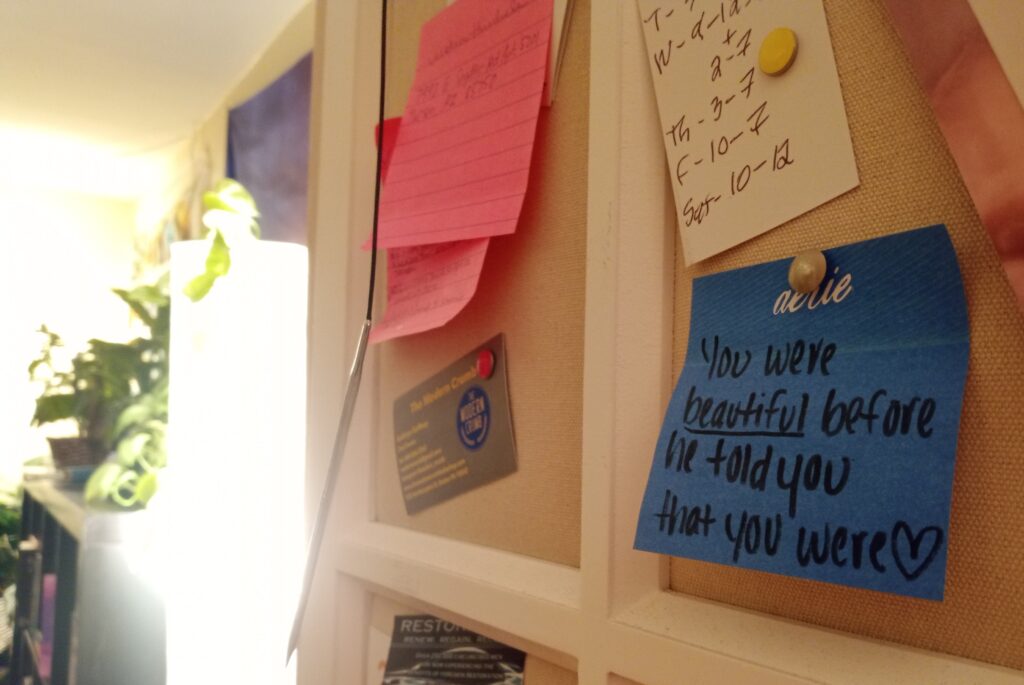
Decreasing checking behavior
There’s someone in my life who can’t go to the beach without pointing out everyone else’s weight and how they “should not” be wearing a certain kind of bathing suit. Really?? This person has become my #1 example of how not to be around body image. I would label this as a checking behavior — this person checks and evaluates bodies of others to relieve their own self-hatred. Checking behaviors come in many forms. They might be the aforementioned comparisons to others, whether in person or by using images. Checking behaviors may also be evident in endless instagram scrolling, often reviewing plastic surgery websites, looking in the mirror (or zoom window) and criticizing an aspect of appearance, weighing oneself, or counting calories, to list a few more. The line between doing this a normal amount and doing this where it becomes problematic is thin — obviously some of this stuff has to occur here and there. But taking notice of these behaviors (“Wow, I weigh myself twice a day”) and then evaluating how they affect you (“How do I feel when I am doing a weigh in?”) can be crucial.
Another aspect to decreasing checking behavior can be developing insight into checking behavior. Perhaps your brain is over-monitoring for some reason. Maybe there’s a more deep-rooted fear there. I believe that my beachgoing, bathing-suit checking peer does this to compensate for a deep fear of gaining weight — the belief system goes like, “If I judge others, and judge myself, then perhaps that’s the motivation that’s holding me back from the brink of letting myself go.” Understanding your beliefs around appearance and body image, and their intersection with checking behaviors, can be crucial in self-soothing and reducing the need for those behaviors to occur, at their very root.
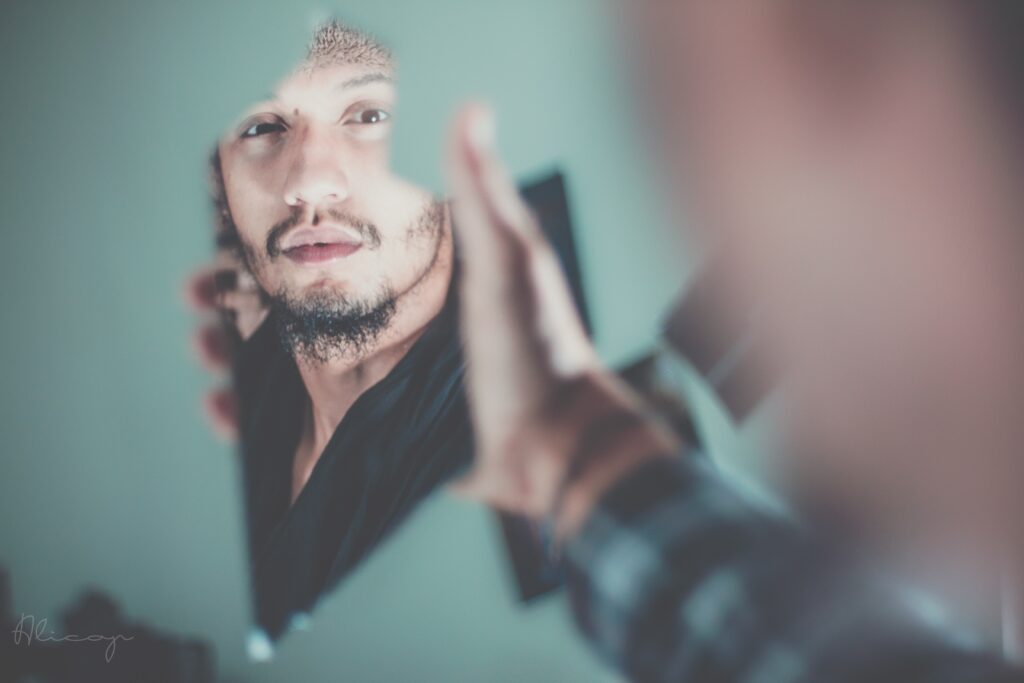
Decrease consumption of biased media
OK, this is a tough one. I live in this world too — I love endlessly scrolling reddit until I’m like, “How did it get to be midnight already??” My proposition for this is to implement a realistic model, rather than go cold turkey (though if you want that, I support you). First, it would likely be beneficial to take stock of the media you consume on a regular basis. How much time are you spending on your phone? (Sad laughter over here, check out my usage stats pre-pandemic and now, what a mess, I get it.) What sort of media do you consume? Movies, TV, magazines, social media, porn, it’s all relevant. Then, consider, how does this affect me? Maybe it’s A-OK that you use instagram, I don’t know. But if it then turns into a few-hour affair of reading plastic surgery reviews and wishing your entire face was different, that may not be feeling good. Adapting your media consumption may involve unfollowing certain accounts, removing phone notifications, setting an app timer, refocusing on more body-positive accounts, or giving yourself frequent breaks.
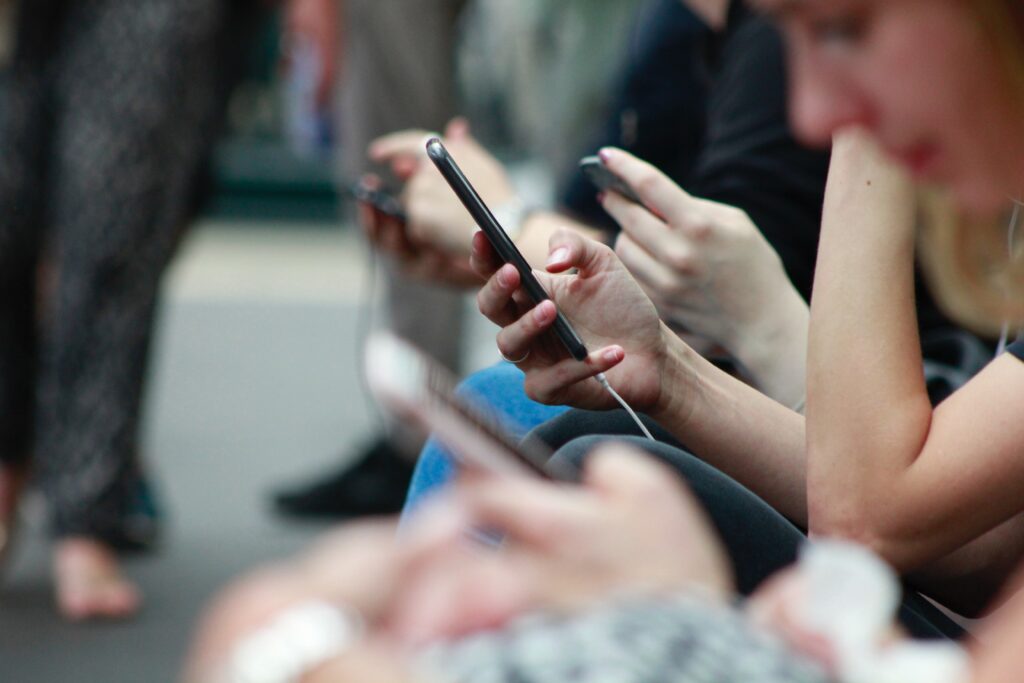
Take up space in personal relationships
Taking space is a concept I talk about frequently: I am a strong advocate that you are entitled to space, particularly in close relationships. What I mean here is, it is OK to be authentically you. In the same way I encouraged you above to take stock of messaging you give yourself around bodies, and messaging the media gives you around bodies, I encourage you to also take stock of messaging you get from peers around bodies. What are they? How do they affect you? Are they helpful? Harmful? How do you hear about bodies in your partnered relationship, in your family, with friends and peers, in your doctor’s office, at work?
I encourage you, if someone expresses an opinion that can be damaging to you: you are allowed to say something about it. You are allowed to take up space. If a partner refers to my hair as “frizzy,” a word I hate, I am allowed to offer a gentle correction: “Hey, I don’t like that word. Can you say wild instead?” Or, if I go to the beach with my critical peer, “When you make those comments, it feels bad. Can we talk about something else instead?”

Meditative exercises & stress reduction
A lot of what I suggested above can be rolled into a meditation — understanding yourself and your thoughts can be an important exercise in developing more self-love and resilience. This can be accomplished by journaling, sitting with yourself and your thoughts, hiking, taking a bath, or meditating using guided visualization, among other relaxation exercises. Furthermore, reducing stress can be a critical component of developing a healthier relationship with you and your body image. I know that when I am thinking about how to talk to a car salesman, the value of my thoughts is inversely related to how late at night it is and how stressed out about the interaction I am. In a similar fashion, we just aren’t our best, most reliable narrators when we are going through a period of immense stress. On top of that, our bodies don’t feel good when we are stressed, which can contribute to a more negatively-skewed assessment.
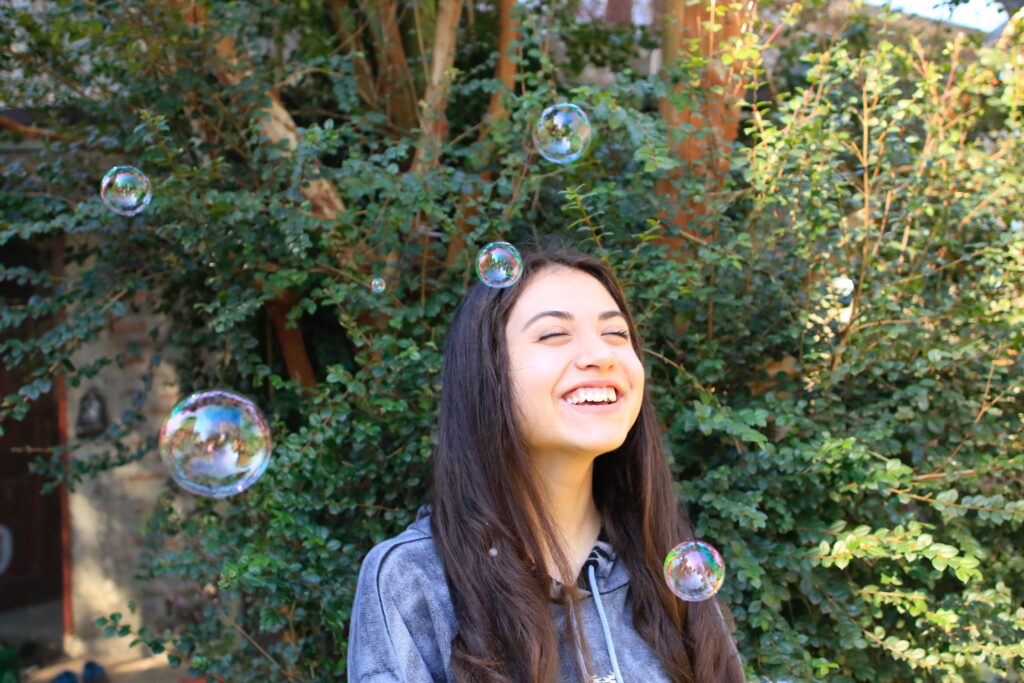
Allow yourself to do something fun
Please, allow yourself some joy and pleasure with your body, and notice the positive sensations and experiences it can give you. How cool is it that you can open that jam jar? (Asking for a friend.) How neat is it that that body allowed you to ski down a slope? How great does it feel to sink into a warm bubble bath, or crazily dance around the kitchen while your meatloaf bakes? How divine is it that your body can orgasm?? How great does it feel to laugh hysterically at some ridiculous video your friend sent you? How banging do you look in that new outfit? How awesome is it that your body allows you to connect with others and experience this world? How delicious is pasta???

Fortunately, I found as I grew that environmental factors had less hold of me, and I could focus more on internal factors relating to my body image, and in doing so, I was able to heal. This involved limiting my exposure to negative environmental factors, and also rewriting the scripts existing around my unhealthy relationship with my body, food, and activity. My relationship with my body rebounded: where there was once criticism, punishment, sadness, and despair, there lingers curiosity and hope, neutrality and celebration.
However, this last year has proven to be a test: I’ve melded into my couch, I’ve dealt with massive stress and fear around the goings-ons this year, I’ve been stuck without many social options, I haven’t been able to exercise as readily, my diet has changed, my activity level has absolutely stagnated, my body has become softer and less adept, I have to be on a small, medium, or large screen for work and relaxation purposes, like, all the time. It’s rough, dude. I’m right here with you. This year has fucking sucked.
Despite this, we persevere. Yes, we are stuck in an environment where we can’t make much change. I’m gonna be stuck looking at my face on videocalls for the majority of the day for the near-to-medium future. And you know what? I can survive this. I may not be able to change the circumstances of this year, but I can control and adapt my response to them. I can put myself first, and continue to nourish this positive relationship with myself, and the way I relate to and feel about my body image.
I wish I could communicate to my younger self that a world exists where I don’t have to feel guilty every time I eat an ice cream cone or whatever. To communicate that feeling great, OK, or even just neutral about my body is possible. And I’m here to say, it’s possible for you, too.

Further Reading:
Bare Reality: 100 Women, Their Breasts, Their Stories
The BDD Workbook: Overcome Body Dysmorphic Disorder and End Body Image Obsessions
Body Drama: Real Girls, Real Bodies, Real Issues, Real Answers
The Body Is Not an Apology, Second Edition: The Power of Radical Self-Love
The Body Project: An Intimate History of American Girls
The Broken Mirror: Understanding and Treating Body Dysmorphic Disorder
Intuitive Eating (A Revolutionary Anti-Diet Approach)
Mothers, Daughters, and Body Image: Learning to Love Ourselves as We Are
Perfectly Imperfect: Compassionate Strategies to Cultivate a Positive Body Image
Pleasure Activism: The Politics of Feeling Good
Things No One Will Tell Fat Girls: A Handbook for Unapologetic Living
